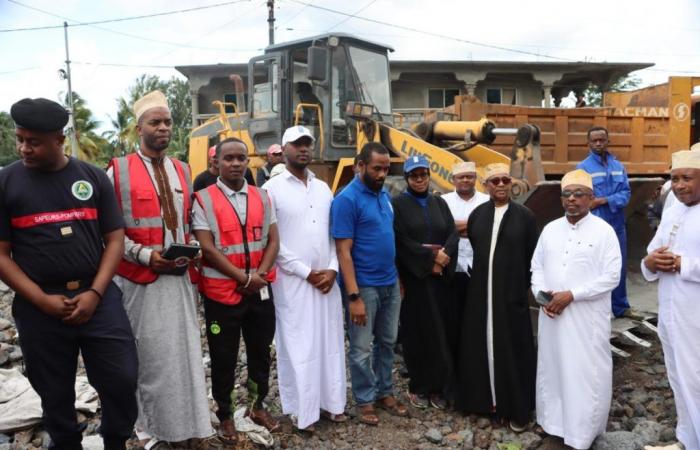In the aftermath of the natural disasters caused by heavy rains, alliances of forces were brought together to assist the disaster areas. These are the efforts made by the United Nations Development Program (UNDP) and the Directorate of Civil Society (DGSC).
In May 2024, the Comoros were victims of heavy rainfall which caused flooding, overflowing of river beds, landslides of river beds, landslides, demolition of dikes and retaining walls, uprooting roadways. Several localities were affected including Fomboni, Wanani, Mboingoma, Hoani, Miringoni, Barakani, Domoni, Hamba, Djoiezi, Wallah and Siriziroudani in Mohéli, Vouani, Vassi, Moya, Sima, Pajé, Mremani, Dindri and Boungweni (Anjouan), etc . It was Ngazidja who paid the heavy price in Bangoi, Mdjoiezi, Singani, Mapvingouni, Mkazi, Mvouni, Serehini, Salimani, Mitsoudje, Singani, Pijani and Moroni (Grande Comore).
Entire neighborhoods were submerged by water. Faced with the emergency, teams went to the field and emergency meetings were organized to present the problem to partners. The General Directorate of Civil Security (DGSC) activated the national contingency plan and mobilized the fixed Command Unit (PC), which allowed humanitarian actors to carry out the first rapid multi-sectoral assessments in the mainly affected localities. These localities were identified on the basis of preliminary assessments carried out by the DGSC from the start of the bad weather.
Nine multisectoral teams made up of national actors, the Red Cross Red Crescent Movement, Médecin Sans Frontière and agencies of the United Nations System.
The finding was clear, in total, 66,835 people including 23,848 in Grande-Comore, 26,554 in Anjouan and 16,433 in Mohéli were affected. Unfortunately, three people lost their lives. Apart from this, latrines were overflowed, tanks contaminated, schools flooded but also road infrastructure including 3 damaged bridges and the collapse of retaining walls on the RN23 road, the landslide on the RN31 and RN 32 and the opening of the ditches. . It has been shown that flooding of homes and latrines, contamination of cisterns and waterways, and the accumulation of garbage risk intensifying the epidemiological situation of Cholera which is plaguing the country.
To support the Comoros, UNDP disbursed a colossal sum of 77 million Comorian francs at the end of last June to carry out emergency work to drain and clean rivers, a cesspool and rock excavation. This work, which lasts 45 days, targets several localities, including the main town of Mitsoudje, the village of Djoumoichongo, Bangoi Hambou, Mdjoezi, Mde and Mavinguni-Moroni.
A sigh of relief for residents who have experienced flooding twice. The Barakani neighborhood was able to return to their homes.
In Mitsoudje, during the launch of the work, a notable from the town of Mitsoudje Elarif Goulam praised the efforts of the UNDP, civil security as well as the government, in particular the Ministry of Planning, for having finally launched this work. According to him, they are essential “for us because this work will bring life back to the city affected by this tragedy, the material losses of which are enormous”. And continued: “Our houses are swept away by the waters. » Reassuring that the city will accompany and provide support to the Chinese company CRGB to clear and clean. Moreover, the community was already mobilized to help residents.
For UNDP, these actions fall within the framework of responding to emergencies and preventing flood risks. Knowing that other studies with the civil security department are still to be considered to avoid such a catastrophe. On site, UNDP disaster risk management analyst Anliyat Mze Ahmed clarified that you should know that “UNDP spares no effort to support the Comoros in their development and works in symbiosis with the government. We launched this work in Mitsoudje because many families are displaced. As you can see, the Barakani neighborhood and these houses are unrecognizable since the beginning of the water flow. We launched this work in Mitsoudje because many families are displaced. The Barakani neighborhood and these houses are unrecognizable since the water began to flow. It was necessary to start with this neighborhood in order to be able to free these houses. Afterwards, we will continue this work in the other villages in the days to come”
The head of the relief and preparation operations center within the DGSC Oumouri Sandi stressed that the choice to start in Mitsoudje is because the city is very affected in terms of flooding. And what’s more, it was in the middle of the city that the flood occurred. According to him, it is imperative for displaced families to return to their homes. The director of the Chinese company CRGB Maekel had advocated for the delay.
In any case, a month after the bad weather in April, the affected families in Mitsoudje, the epicenter of the floods, have returned to their respective shelters. This is thanks to the efforts of the Chinese company CRGB responsible for cleaning work on the canal financed by the UNDP. So the families returned to their respective homes.
Who could believe it? Everyone thought that such a project would last several months. But the Chinese company CRGB turned the dream into reality in just one week. A great relief for the victims, especially the Barakani district where the passage of water hit hard. Displaced from their homes having become uninhabitable, they are now in their homes. “I am very happy to have returned home. I can’t believe my eyes, it’s incredible. Of course, we have lost things and others are damaged by the waters, but the important thing is to return home. The rest will follow,” testifies this resident who saw her house swept away by the waters. Nassuf Ben Amad hopes to see better days. “Although my cabin remained intact, I still have the memory of that night when I saw my belongings taken away. Others followed a shock.”
Another told us “When I saw all these stones and sand I never believed that I could come back one day. I told myself it was going to take a lot of months. It traumatizes me every day. Thank God we just got rid of the debris. We are back,” testifies Mama Halima while saluting the Comoros government for the rapid response. Thus, the cleaning work planned in other localities was completed thanks to the efforts made by the Chinese company CRGB.






